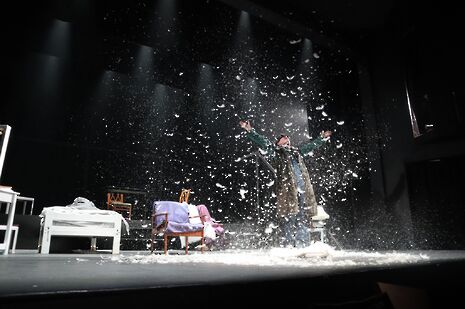Angels in America review
The ADC production of part one of this Pulitzer Prize winning drama is technically impressive, made gripping by an outstanding cast

It is 1985. Ronald Reagan and AIDS settle definitively on America. In this setting, Tony Kushner’s two-part play depicts the devastation that struck an entire generation of gay men. It centres on Prior (Leo Reich) and his boyfriend Louis (Bilal Hasna) as they deal with Prior’s diagnosis, as well as Harper (Billie Collins) and Joe (Conor Dumbrell), a Mormon couple in denial about Joe’s homosexuality, and Roy Cohn (Joe Tyler Todd), a highly ambitious and closeted gay lawyer. Unsurprisingly, the first part of Angels in America is heavy, but this production proves itself up to the task with expert production choices and a stellar cast.
Each component of the play comes together to form a smooth and cohesive whole, starting with the set. Making use of the stage’s depth, bright white lights split the space down the middle and outline a third, elevated section at the back. The lights guide the audience’s eyes to the action, allowing Director Alistair Henfrey to juxtapose the unravelling of our two main couples. Their steady back-and-forth slowly ramps up to a brilliant scene where every few lines mark a switch from one couple to the other, as each of their worlds crashes around them. The blocking throughout ensures the intertwined scenes are never confusing. Music is used just sparingly enough: car horns, ringtones, jazz and haunting vocals punctuate the silence, but the greatest auditory impact is reserved for the angel voice that reverberates through the theatre. How they use their bodies is just as important as the actors’ voices, as their movements frequently contrast with their words. They do an excellent job of incorporating the play’s motifs into the subtleties of their performances, whether it’s the distance between the characters reflected in their body language or subtle movements and costume adjustments betraying the dishonesty behind their words.
"Each of the cast excels in their own right, while also playing off each other in a way that reveals deep connections to each other."
All the technical effort would be wasted if it weren’t for the breath-taking acting on display. Anna Wright and Ella Blackburn demonstrate versatility in their various characters: Wright’s nurse and realtor appearances are short but fun, and Blackburn’s many roles are all believable and instantly engaging. Ciaran Constable is less consistent, beginning stiffly and with stilted line delivery, although they come into their own for a compelling scene with Louis in the play’s second half. The rest of the cast each excel in their own right, while also playing off each other in a way that reveals deep connections to each other. Tyler Todd succeeds in portraying a Roy Cohn who is tearing himself apart, confronted with the physical reality of a disease that is an affront to the identity he has constructed for himself; he is unapologetically ambitious, vicious in his denial, manipulative and self-deluding in a way that is emblematic of men in Washington.
The antithesis to Roy is Joe, self-hating and dissatisfied but ultimately moral and willing to take a chance on his own happiness. Dumbrell is strongest in Joe’s vulnerable moments, first in coming out to his mother and then in his increasingly intimate conversations with Louis. Their easy closeness contrasts with his inability to be what his wife Harper needs him to be despite his love for her. Collins as Harper seems to play a little into the hysterical shut-in wife trope, but she works in enough depth to make her feel real rather than like a caricature of mental illness. Hasna’s Louis is also wonderfully human in his flaws: guilt and love and loss seem to flash across his face, complementing the intensity of his words. His and Prior’s chemistry is the most believable of them all, showing an easy familiarity and genuine affection that collide with the fear and disgust Prior’s HIV symptoms bring into the picture. Among all these incredible performances though, Reich as Prior was a standout for me. He shifts effortlessly from irreverent and sardonic quips to displays of mortal terror and grief that gave me chills. He has to carry a number of scenes on his own and shows himself just as capable of letting his expressions tell a story all on their own as he is of letting out a visceral shriek.
Angels in America is a play full of anguish, yet this production is grounded enough that it never feels gratuitous. Moments of much-needed levity are never too far off, meshing so seamlessly into the dialogue that they never cause any drastic tonal shift. It is a visually stunning, emotionally powerful show that excels all around. I wish I could write another 500 words about the intricacies of the narrative, but instead, I will leave you with the assurance that the cast and crew have done this modern classic justice.
 News / Clare Hall spent over £500k opposing busway 24 December 2025
News / Clare Hall spent over £500k opposing busway 24 December 2025 Comment / The ‘class’ of Cambridge24 December 2025
Comment / The ‘class’ of Cambridge24 December 2025 News / Caius mourns its tree-mendous loss23 December 2025
News / Caius mourns its tree-mendous loss23 December 2025 Comment / League tables do more harm than good26 December 2025
Comment / League tables do more harm than good26 December 2025 News / Girton JCR publishes open letter expressing solidarity with Palestine25 December 2025
News / Girton JCR publishes open letter expressing solidarity with Palestine25 December 2025









